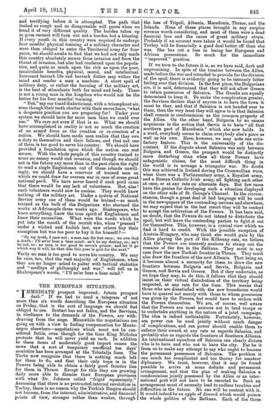THE EUROPEAN SITUATION.
" TMMEDIATE prospect improved; future prospect dark." If we had to send a telegram of not more than six words describing the European situation on Friday, that is the sort of language we should feel obliged to use. Scutari has not fallen, and the Servians, in obedience to the demands of the Powers, are with- drawing from the siege. Meanwhile the negotiations are going on with a view to finding compensation for Monte- negro elsewhere—negotiations which must not be con- sidered futile, even though for the time Kinc, Nicholas protests that he will never yield an inch. In addition to these items of moderately good import comes the news that a sort of temporary unofficial ten days' armistice has been arranged at the Tchatalja lines. The Turks now recognize that there is nothing much left for them to do, and that their only hope is in the Powers beine.r' able to obtain a fairly good frontier line for them in Thrace. Except for this they are growing daily more able to dismiss their European provinces with what Dr. Johnson called "frigid equanimity." Assuming that there is no protracted internal revolution in Turkey, there is no reason why the Turkish Empire should not become, from the internal, administrative, and financial points of view, stronger rather than weaker, through the loss of Tripoli, Albania, Macedonia, Thrace, and the Islands. None of these places brought in any surplus revenue worth considering, and most of them were a dead financial loss and the cause of great military strain. Probably if an account were taken it would be found that Turkey will be financially a good deal better off than she was. She has cut a loss in losing her European and African possessions. So much for the immediate " improved " position.
If we turn to the future it is, as we have said, dark and unpromising. In spite of the treaties between the Allies, made before the war and intended to provide for the division of the spoil, there is evidently going to be intensely bitter feeling over that division. In the first place, the Bulgarians are, it is said, determined that they will not allow Greece to retain possession of Salonica. The Greeks are equally determined to keep it. To make the complication greater, the Servians declare that if anyone is to have the town it must be they, and that if Salonica is not handed over to them, then the very least they will agree to is that Salonica shall remain in condominium as the common property of the Allies. On the other band, Bulgaria by no means acquiesces in the notion that Servia is to have "all that northern part of Macedonia" which she now holds. In a word, everybody seems to claim everybody else's piece as well as his own. Here, however, we may note one satis- factory feature. This is the universality of the dis- content. If the dispute about Salonica was only between Bulgaria and Greece, the prospect would be distinctly more disturbing than when all three Powers have antagonistic claims, for the most difficult thing in the world is to arrange a triangular war. No doubt this was achieved in Ireland during the Cromwellian wars, when there was a Parliamentary army, a Royalist army, and a Roman Catholic Irish army, all fighting each other at once, or at any rate on alternate days. But few races have the genius for developing such a situation displayed on the other side of St. George's Channel. In the circum- stances, though a great deal of bad language will be used in the newspapers of the contending nations and elsewhere, we may expect that in the last resort they will be content to accept the arbitration of the Powers. It has been said, no doubt, that the Powers do not intend to distribute the spoil, but will leave the contending parties to fight it out for themselves. This, however, is a cynical view which we find it hard to credit. With the possible exception of Austria-Hungary, who may think she would gain by the Allies playing the part of the Kilkenny cats, we believe that the Powers are sincerely anxious to stamp out the remains of the fire in the Balkans. They must in any case draw the new Turkish frontier in Thrace. They must also draw the frontiers of the new Albania. That being so, it becomes almost a necessity for them to draw the new frontiers between Bulgaria and Servia, Bulgaria and Greece, and Servia and Greece. But if they undertake, as we hope they may, to do this, it follows that they should insist on their virtual distribution of the territory being respected, at any rate for the time. This means that those who are dissatisfied with the new boundaries would have to quarrel not merely with those to whom possession was given by the Powers, but would have to reckon with the Powers themselves. We are, of course, well aware that the Powers are most anxious not to land troops or to undertake anything in the nature of a joint campaign. The idea is indeed unthinkable. Fortunately, however, sea power can be used jointly without much danger of complications, and sea power should enable them to enforce their award, at any rate as regards Salonica„ and probably also as regards the frontiers of Southern Albania. An international squadron off Salonica can clearly dictate who is to have and who not to have the city. Far be it from us to make any attempt to say who ought to become the permanent possessors of Salonica. The problem is one much too complicated and too thorny for amateur diplomacy. We trust, however, that it may be found possible to arrive at some definite and permanent arrangement, and that the plan of making Salonica, a condominium jointly possessed by the Allies or an inter- national port will not have to be resorted to. Such an arrangement must of necessity lead to endless troubles and difficulties in the future. No one will be content with it. It would indeed be an apple of discord which would poison the whole politics of the Balkans. Each of the three Allies would bend all their energies to the attempt to secure it.
One more point remains to be noted. Though feeling at the moment seems exasperated amongst the Allies, we must never forget that though each in turn threatens the other with making friends with Austria-Hungary and so gaining an advantage, all three of the Allies really dread the power of Austria-Hungary. One of them, indeed, Servia, cherishes the notion that if to the problem of the dissolution of the Turkish Empire succeeds the problem of the dissolution of Austria-Hungary, her time will come, and Roumania probably thinks the same. Servia in fine, in spite of her threats of coming to an agreement with Austria-Hungary, wants to keep her powder dry and to husband her resources for making good her dream of a great Serb kingdom formed out of Bosnia, Herzegovina, and Croatia, and other fragments of the Dual Monarchy. But to make Bulgaria her permanent and deadly enemy might easily render her aspirations here abortive. These, however, are speculations too big to be indulged in on the present occasion. We merely mention them to show that there is reason to feel that in the last resort it will not be worth the while of Servia to indulge in a new war, the effect of which might be to render her too weak ever to play the great part which she hopes for in the future. In these discussions, however, one always comes back to the question of what is Austria-Hungary going to do ? All depends upon that. If Austria-Hungary, even at the eleventh hour, were to determine that German pride and Magyar pride must give way to the interests of the Empire as a whole, and if the Dual Monarchy were to give its Slavonic populations their rights, either under a Triple Monarchy or, better still, under a Federal system analogous to that which exists in Germany, it is not difficult to imagine a re-established and rejuvenated Austria-Hungary which might give the lie to all the hopes and aspira- tions of the Balkan States. Such a wise and liberal policy is certainly what all true friends of Austria- Hungary will hope to see accomplished. If, however, as we fear is more likely to be the case, Austria-Hungary insists that things shall go on as before, and that the Austro-Hungarian Slav is to remain for ever a hewer of wood and drawer of water, then assuredly the dissolution of the Dual Monarchy must come, not rapidly perhaps, but still inevitably. If Croatia is to be treated in the future as Croatia has been treated during the last five or six years, there can be no hope of the Dual Monarchy making her foundations permanent. In a word, the problem of Austria-Hungary is how to conciliate her Slavonic provinces. Unless she succeeds in doing that her empire must sooner or later be dissolved.











































 Previous page
Previous page